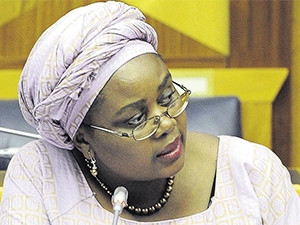
The portfolio committee on telecommunications and postal services has accused suppliers of over-charging government for their services.
Speaking during the GovTech conference in Durban yesterday, Mmamoloko Kubayi, chairperson of the portfolio committee, said Parliament is increasingly finding that within the ICT sector, or even broadly, something costs less if it's not procured or bought by government.
"When the word 'government' comes into being, the price goes higher. This is concerning us. We have a shrinking fiscal framework and less budget available; we do not have money that is sitting there somewhere."
Kubayi appealed to the suppliers that are doing business with the state to "please not charge us R10 when the true cost of the product is R2. Cost escalations are impacting government negatively. It is worrying us; and we are watching the trend.
"The minister of public works has indicated that for a glass of water that normally costs R5, service providers charge R150 to government. This can't be correct."
Poverty reduction
She also noted there is overwhelming evidence that ICT will only become an effective and mainstream tool of poverty reduction and sustainable development if it deals directly with relevant issues that relate to developmental priorities.
"During the GovTech conference, we have witnessed some innovative ideas from South Africans. However, we have also been exposed to some weaknesses in our system, which we need to take back to Parliament to find solutions."
According to Kubayi, one weakness is that there is no harmonisation of various business initiatives, which can offer a lot of lessons to government.
"We have seen a lot of e-health solutions but the problem we have seen is that the solutions are sitting in people's homes but not in clinics and hospitals where they are most needed.
"After 10 years of GovTech, we need to be more biased towards the implementation of what we have seen through these ICT exhibitions so that we can share expertise, weaknesses, and strengths of our implementations. This will help in assisting the impact that the annual GovTech conference makes."
Telecoms costs
She also lamented that the costs of telecommunications in SA are too exorbitant, to the extent that some people do not have access.
"In the face of the high cost of making calls, we want to make use of cheap and powerful ways of communicating, for people to maintain their social relationships. We would want to make use of the Internet to learn informally and formally; people need it [Internet] in their work or businesses to improve their prospects," said Kubayi.
However, she said, the high cost of communication services often present barriers to electronic commerce development.
"Therefore, my message is that we all are expected to encourage price reduction in ICT services in order not to alienate further those that are already on the other side of the digital divide."
According to the Stats SA 2014 report, she noted, 40.9% households have at least one member of the family who has access to the Internet. About 10% of the households have Internet access at home.
In order to achieve an inclusive and development-oriented information society, Kubayi believes it is necessary to ensure there is appropriate technical and institutional infrastructure in place to support new technologies.
"We need to ensure that our society should improve the number of people who have access to the Internet and that can only be achieved through ensuring we have the infrastructure that is needed."
Rural communities
The Bill of Rights in the South African Constitution is the cornerstone of democracy, said Kubayi, adding that section 16, sub-section 10 A and B guarantee individual rights to access information, and freedom to receive information.
Rural communities also have a right to communicate, she pointed out. "How do we explain that 21 years down the road, there are some communities that can't even afford to make a phone call?
"We experienced this when we visited one of the rural villages in Limpopo province. We were told sad stories as the portfolio committee. In order for that community to just make a phone call, you need to walk for about at least 15 to 20 minutes to be able to have access to make the call. In the evenings when there are emergencies, they cannot make phone calls for help.
"This is part of South Africa that still exists and it is a challenge for us that we need to find solutions to this. We cannot be contributing to creating more inequalities in our societies."
Imagine a young person who grows up in this community - they will continue to be unable to cope and compete as well as unable to interact with their peers in the urban areas, she said.
These are areas which do not even have access to 2G, while a child in an urban area has access to LTE. This is the reality of our inequalities today, said Kubayi.
In the long term, she explained, one of the priorities of the National Development Plan is to make high-speed broadband Internet universally available at competitive prices.
"To realise this goal, all the ingredients need to be in place - we need strong leadership that is able to give direction in where we are going as a country. We need infrastructure that will support our goals; we need sound regulations so that investors know where the country is going. We need policies that are very clear so as to create a predictable environment.
"If we are not able to do these things, we will remain uncompetitive compared to our peers globally. We need to see and find ways to close the last mile connectivity."
Share